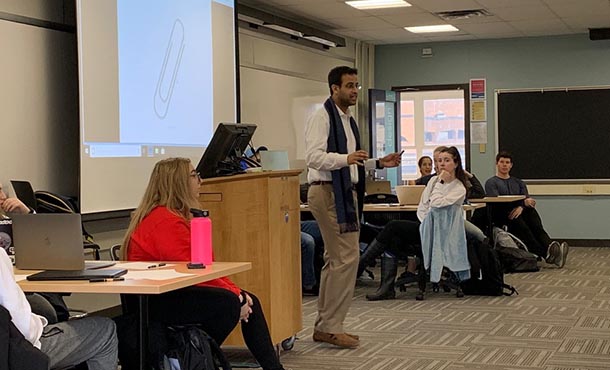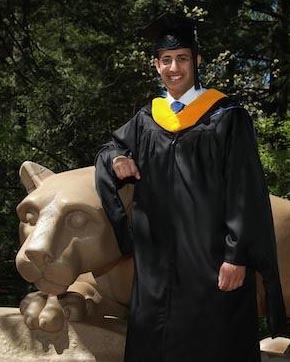
Penn State alumnus Mohammad AlSager AlZayed implores current students to take advantage of the University’s myriad of resources, in an event held prior to the pandemic. IMAGE: MOHAMMAD ALSAGER ALZAYED
The human factor: Empowering engineering education
10/19/2020
By Miranda Buckheit
UNIVERSITY PARK, Pa. — Mohammad AlSager AlZayed always knew that he wanted to be an engineer, but he didn’t realize his passion for engineering education until he began his academic career at Penn State.
AlZayed came to the Harold and Inge Marcus Department of Industrial and Manufacturing Engineering in 2012 because he wanted to earn his “degree from the first ever industrial engineering department in the world.”
He said industrial engineering was the best option for him due to its wide applicability.
“Industrial engineering includes a lot of the tools from the other disciplines in one,” AlZayed said. “Industrial engineers are equipped to make an impact, and there’s no better place to go than Penn State. I loved the community when I got here because of the spirit and energy everyone has.”
AlZayed completed his bachelor’s and master’s degrees in industrial engineering at the University in 2016 and 2017, respectively. In summer 2020, AlZayed received his doctoral degree in industrial engineering, with a focus in human factors.
After graduation, AlZayed accepted an assistant professor position at Kuwait University in its Department of Industrial and Management Systems Engineering.
As a Penn State student, AlZayed was heavily involved with various organizations as an undergraduate student and took up roles with the American Organization for Quality, the International Student Council and National Organization for Business and Engineering (NOBE). He was also a member, and former president, of the Penn State chapter of the Human Factors and Ergonomics Society.
AlZayed said NOBE taught him the meaning of engineering education, which drove him to pursue his graduate studies.
“As a student-run club, we had to work to deliver fun, useful content to the members,” AlZayed said. “I really felt the power and impact that education can have from the content creator side and content receiver side.”
Moving forward with curiosity
AlZayed was a member of the Brite (Bridging Research in Innovation, Technology and Engineering) Lab run by Scarlett Miller, associate professor of engineering design and industrial engineering and director of the School of Engineering Design, Technology, and Professional Programs’ (SEDTAPP) engineering design program.
“I got to know Dr. Miller during my sophomore year of college,” AlZayed said. “I had no hesitation in joining her lab. What better way to study creativity than to work with a creative person? She set a high bar for what it really means to be an engineering educator.”
AlZayed also joined the THRED (Technology and Human Research in Engineering Design: Group as a graduate student, where he worked with co-directors Christopher McComb, assistant professor of engineering design; and Jessica Menold, assistant professor of engineering design and mechanical engineering.
During his time as a master’s student, AlZayed wanted to understand what factors influence an entrance-to-major student’s engineering discipline choice.
To investigate this question, AlZayed worked closely with Miller in the Brite Lab.
Using Penn State undergraduate engineering students as a sample population, AlZayed analyzed gender, ethnicity, citizenship, state residency and more. AlZayed also explored whether or not students stuck with their decided major through graduation.
“I really learned that as engineering educators we have a lot to do in means of room for improvement for inclusivity,” AlZayed said. “Underrepresented groups aren’t often presented engineering as an option; however, there is still room to intervene and offer inclusive spaces.”
Furthering his work during his doctoral studies, AlZayed began to study how empathy has a factor in the design process. AlZayed partnered with Miller, McComb and Menold via the Brite Lab and THRED Group.
AlZayed explained that empathy is important to both the design process and creativity, so he wanted to learn how to tap into engineering students’ empathic side.
“I closely examined the experiences of students in SEDTAPP’s first-year engineering design course, EDSGN 100, for my dissertation,” AlZayed said. “They worked on projects that were focused on humanitarian engineering design projects. Specifically, they were working on the United Nations’ sustainability development goal of good health and well-being.”
While most of the work is still under peer review for journal publication, AlZayed said that the biggest takeaway was that students have a lot of potential in driving empathy during the design process. Recently, a chapter of his dissertation was published in the Journal of Mechanical Design.
“Mo is a deeply empathic individual,” McComb said. “Thinking back on the work that we did together, I can’t tell if he became more empathic because of the research he did on the subject, or if he ended up studying something that was already important to him. Either way, he’s a great person and a great researcher, and the two are definitely related through that common thread.”
Taking the Penn State spirit along
AlZayed said one of the most important things he learned from his time at Penn State was to take advantage of the University’s myriad of resources.
“Make use of the Penn State experience.” AlZayed said. “There are amazing faculty, peers, organizations and experiences — and you’ll make lifelong friends. I miss being at Penn State, and I haven’t really said goodbye.”
Now that his time at Penn State is over, AlZayed is focusing on translating what he learned as student into his work as a faculty member at Kuwait University.
He noted that there are still large misconceptions surrounding engineering fields. AlZayed feels that its critical to help students break down any false perceptions and let them explore what engineering field ignites their passion.
“Mechanical engineering isn’t all about working with your hands, just like industrial engineers don’t all work in factories,” AlZayed said. “Someone back home asked if I would be in human resources after I graduated, but that’s not what human factors engineering is. We work to make things better for people.”
The alumni spotlight series from the Penn State Harold and Inge Marcus Department of Industrial and Manufacturing Engineering (IME) highlights innovators, makers and those that personify engineering excellence in industry and academia. Established in 1908, the department has graduated over 8,000 industrial engineers who can be found across the world in varying industries. The department, home to the first industrial engineering program in the world, made a name for itself in the engineering industry through its storied tradition of unparalleled excellence and innovation in research, education and outreach. To learn more about IME and how to get involved, visit ime.psu.edu.




